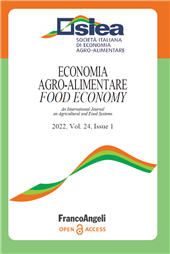Factors Influencing Fruits And Vegetables Consumption among Pregnant Women : evidence from Enugu State, Nigeria
1-23 p.
Despite fruits and vegetables' importance and nutrient composition, their consumption is still below the world's recommended threshold in Nigeria, even among pregnant women. Therefore, this study examined pregnant women's critical socioeconomic and demographic factors associated with fruit and vegetable consumption. Multistage sampling techniques and a semistructured questionnaire were employed to collect data from 100 pregnant women from the study area. The descriptive statistics show that the majority (91%) of the respondents belong to the age bracket of 20 to 36 years. Also, most (56%) of the respondents were in their third trimester, while 30% and 14% were in the second and firsttrimester, respectively. The study employed descriptive and inferential statistics to analyse the data.
The results indicate that Education, Trading, firsttrimester, income, and nutrition advice positively influenced expenditure on fruits and vegetables. On the other hand, age, secondtrimester, thirdtrimester, attending antenatal, and distance from home to market have an inverse relationship with expenditure on fruits and vegetables. Likewise, education, nutrition advice, trading, firsttrimester positively influence the frequency of fruits and vegetable consumption. The study recommended that policymakers, government, and NGOs should be focused on the significant socioeconomic factors to encourage fruit and vegetable consumption among pregnant women. [Publisher's text].
Ist Teil von
Economia agro-alimentare : XXIV, 1, 2022-
Artikel aus derselben Ausgabe (einzeln erhältlich)
-
Informationen
ISSN: 1972-4802
THEMENBEREICHE
KEYWORDS
- Nutrition, Diets, Fetus, Socioeconomics, Countmodel


